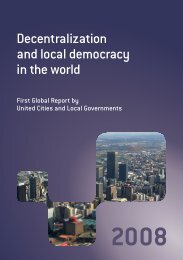Making Cities Resilient Report 2012
Making Cities Resilient Report 2012
Making Cities Resilient Report 2012
Create successful ePaper yourself
Turn your PDF publications into a flip-book with our unique Google optimized e-Paper software.
Partners in the<br />
Global Campaign<br />
<strong>Making</strong> <strong>Cities</strong><br />
<strong>Resilient</strong>: My City<br />
is Getting Ready!<br />
Many international, regional, national and private sector<br />
partners are supporting activities and local governments<br />
in the global campaign <strong>Making</strong> <strong>Cities</strong> <strong>Resilient</strong>, whose<br />
objectives are to improve capacities to deal with disaster<br />
risk at city level in each country. The most active partners<br />
include networks of cities such as United <strong>Cities</strong> and<br />
Local Governments (UCLG), ICLEI-Local Governments for<br />
Sustainability, CITYNET and the Earthquake Megacities<br />
Initiative (EMI); international organisations such as the<br />
European Commission (ECHO), the World Bank Global Facility<br />
for Disaster Reduction and Recovery; UN agencies and<br />
programmes, with UN-Habitat in the lead; NGOs and their<br />
networks (notably the Chinese-based World <strong>Cities</strong> Scientific<br />
Development Alliance—WCSDA); the Global Network of<br />
Civil Society Organisations for Disaster Reduction; PLAN<br />
International; GROOTS International (with the Huairou<br />
Commission); academia and private sector companies,<br />
through the UNISDR Private Sector Advisory Group; national<br />
associations of local governments; and national authorities<br />
and National Platforms for Disaster Reduction.<br />
The principal partners<br />
that have supported the<br />
development of this <strong>Making</strong><br />
<strong>Cities</strong> <strong>Resilient</strong> <strong>Report</strong> <strong>2012</strong><br />
include:<br />
UN International Office for Disaster Risk<br />
Reduction (UNISDR)<br />
www.unisdr.org<br />
The United Nations Office for Disaster Risk Reduction<br />
(UNISDR) is the UN focal point for the coordination of disaster<br />
risk reduction activities and leads a vibrant network that<br />
includes UN Member States, intergovernmental and nongovernmental<br />
organisations, financial institutions, the<br />
private sector, scientific and technical bodies, and civil<br />
society. UNISDR is spearheading the current campaign to<br />
create global awareness of the benefits of disaster risk<br />
reduction and empower people to reduce their vulnerability<br />
to hazards. The Campaign on <strong>Making</strong> <strong>Cities</strong> <strong>Resilient</strong> has<br />
mobilized—through the end of 2011—more than 1,000 cities<br />
and local governments who have committed to making<br />
their cities safer and more resilient to disasters, in support<br />
of the Hyogo Framework for Action 2005-2015: Building<br />
the Resilience of Nations and Communities. UNISDR is the<br />
custodian of this Framework and the International Strategy<br />
for Disaster Reduction, which is applied by governments and<br />
other stakeholders. Advocating for including crosscutting<br />
issues such as climate change, education and gender into<br />
risk reduction initiatives, UNISDR prepares a biennial Global<br />
Assessment <strong>Report</strong> on disaster risk reduction and analysis<br />
of the natural hazards that affect humanity.<br />
The Global Facility for Disaster Reduction<br />
and Recovery<br />
www.gfdrr.org<br />
Established in 2006, the Global Facility for Disaster Reduction<br />
and Recovery (GFDRR) is a partnership of 41 countries and<br />
eight international organisations, hosted at the World Bank,<br />
committed to helping developing countries reduce their<br />
vulnerability to natural hazards and adapt to climate change<br />
through three tracks: Global and Regional Partnerships;<br />
Mainstreaming Disaster Risk Reduction into Development;<br />
and Standby Recovery Financing Facility for Accelerated<br />
Disaster Recovery. The partnership’s mission is to mainstream<br />
disaster risk reduction and climate change adaptation into<br />
country development strategies by supporting a country-led<br />
and managed implementation of the Hyogo Framework for<br />
Action.<br />
ICLEI - Local Governments for Sustainability<br />
www.iclei.org<br />
ICLEI is an international association of more than 1,200 cities<br />
and their associations worldwide as well as local, national<br />
and regional government organisations who have made<br />
a commitment to sustainable development. ICLEI drives<br />
positive change on a global scale through programmes<br />
and campaigns on local sustainability. It is also a resource<br />
center, offering information, tools, networking, training<br />
and consulting services. ICLEI serves as Secretariat of the<br />
World Mayors Council on Climate Change, which launched<br />
the Mayors Adaptation Forum as an annual platform<br />
80 | <strong>Making</strong> <strong>Cities</strong> <strong>Resilient</strong> <strong>Report</strong> <strong>2012</strong>

















